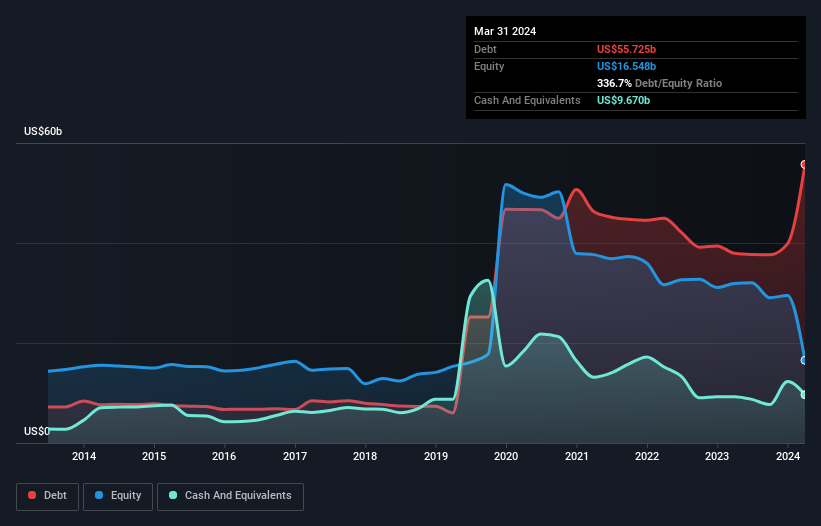
The external fund manager backed by Berkshire Hathaway's Charlie Munger, Li Lu, makes no bones about it when he says 'The biggest investment risk is not the volatility of prices, but whether you will suffer a permanent loss of capital.' So it might be obvious that you need to consider debt, when you think about how risky any given stock is, because too much debt can sink a company. As with many other companies Bristol-Myers Squibb Company (NYSE:BMY) makes use of debt. But is this debt a concern to shareholders?
What Risk Does Debt Bring?
Debt is a tool to help businesses grow, but if a business is incapable of paying off its lenders, then it exists at their mercy. Ultimately, if the company can't fulfill its legal obligations to repay debt, shareholders could walk away with nothing. However, a more common (but still painful) scenario is that it has to raise new equity capital at a low price, thus permanently diluting shareholders. By replacing dilution, though, debt can be an extremely good tool for businesses that need capital to invest in growth at high rates of return. When we think about a company's use of debt, we first look at cash and debt together.
View our latest analysis for Bristol-Myers Squibb
What Is Bristol-Myers Squibb's Debt?
You can click the graphic below for the historical numbers, but it shows that as of March 2024 Bristol-Myers Squibb had US$55.7b of debt, an increase on US$37.9b, over one year. However, because it has a cash reserve of US$9.67b, its net debt is less, at about US$46.1b.

How Strong Is Bristol-Myers Squibb's Balance Sheet?
The latest balance sheet data shows that Bristol-Myers Squibb had liabilities of US$25.8b due within a year, and liabilities of US$56.7b falling due after that. Offsetting this, it had US$9.67b in cash and US$14.1b in receivables that were due within 12 months. So it has liabilities totalling US$58.8b more than its cash and near-term receivables, combined.
This deficit is considerable relative to its very significant market capitalization of US$87.2b, so it does suggest shareholders should keep an eye on Bristol-Myers Squibb's use of debt. This suggests shareholders would be heavily diluted if the company needed to shore up its balance sheet in a hurry.
In order to size up a company's debt relative to its earnings, we calculate its net debt divided by its earnings before interest, tax, depreciation, and amortization (EBITDA) and its earnings before interest and tax (EBIT) divided by its interest expense (its interest cover). The advantage of this approach is that we take into account both the absolute quantum of debt (with net debt to EBITDA) and the actual interest expenses associated with that debt (with its interest cover ratio).
Bristol-Myers Squibb's net debt is 2.5 times its EBITDA, which is a significant but still reasonable amount of leverage. But its EBIT was about 10.8 times its interest expense, implying the company isn't really paying a high cost to maintain that level of debt. Even were the low cost to prove unsustainable, that is a good sign. Unfortunately, Bristol-Myers Squibb's EBIT flopped 13% over the last four quarters. If earnings continue to decline at that rate then handling the debt will be more difficult than taking three children under 5 to a fancy pants restaurant. There's no doubt that we learn most about debt from the balance sheet. But it is future earnings, more than anything, that will determine Bristol-Myers Squibb's ability to maintain a healthy balance sheet going forward. So if you want to see what the professionals think, you might find this free report on analyst profit forecasts to be interesting.
Finally, while the tax-man may adore accounting profits, lenders only accept cold hard cash. So it's worth checking how much of that EBIT is backed by free cash flow. Over the last three years, Bristol-Myers Squibb actually produced more free cash flow than EBIT. There's nothing better than incoming cash when it comes to staying in your lenders' good graces.
Our View
Both Bristol-Myers Squibb's ability to to convert EBIT to free cash flow and its interest cover gave us comfort that it can handle its debt. In contrast, our confidence was undermined by its apparent struggle to grow its EBIT. When we consider all the factors mentioned above, we do feel a bit cautious about Bristol-Myers Squibb's use of debt. While we appreciate debt can enhance returns on equity, we'd suggest that shareholders keep close watch on its debt levels, lest they increase. There's no doubt that we learn most about debt from the balance sheet. However, not all investment risk resides within the balance sheet - far from it. We've identified 2 warning signs with Bristol-Myers Squibb , and understanding them should be part of your investment process.
If you're interested in investing in businesses that can grow profits without the burden of debt, then check out this free list of growing businesses that have net cash on the balance sheet.
Valuation is complex, but we're here to simplify it.
Discover if Bristol-Myers Squibb might be undervalued or overvalued with our detailed analysis, featuring fair value estimates, potential risks, dividends, insider trades, and its financial condition.
Access Free AnalysisHave feedback on this article? Concerned about the content? Get in touch with us directly. Alternatively, email editorial-team (at) simplywallst.com.
This article by Simply Wall St is general in nature. We provide commentary based on historical data and analyst forecasts only using an unbiased methodology and our articles are not intended to be financial advice. It does not constitute a recommendation to buy or sell any stock, and does not take account of your objectives, or your financial situation. We aim to bring you long-term focused analysis driven by fundamental data. Note that our analysis may not factor in the latest price-sensitive company announcements or qualitative material. Simply Wall St has no position in any stocks mentioned.
About NYSE:BMY
Bristol-Myers Squibb
Bristol-Myers Squibb Company discovers, develops, licenses, manufactures, markets, distributes, and sells biopharmaceutical products worldwide.
Undervalued with reasonable growth potential and pays a dividend.
Similar Companies
Market Insights
Community Narratives


